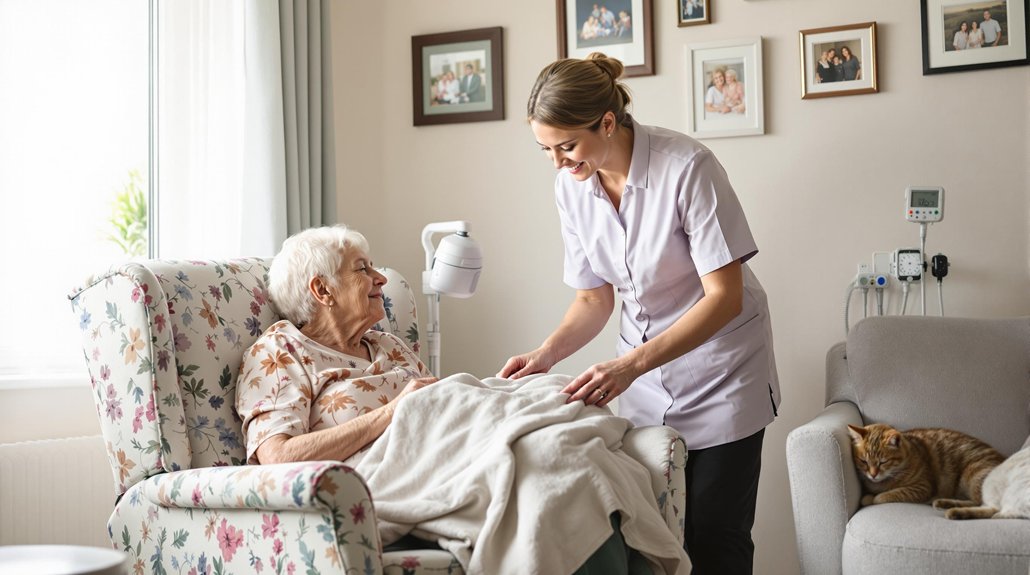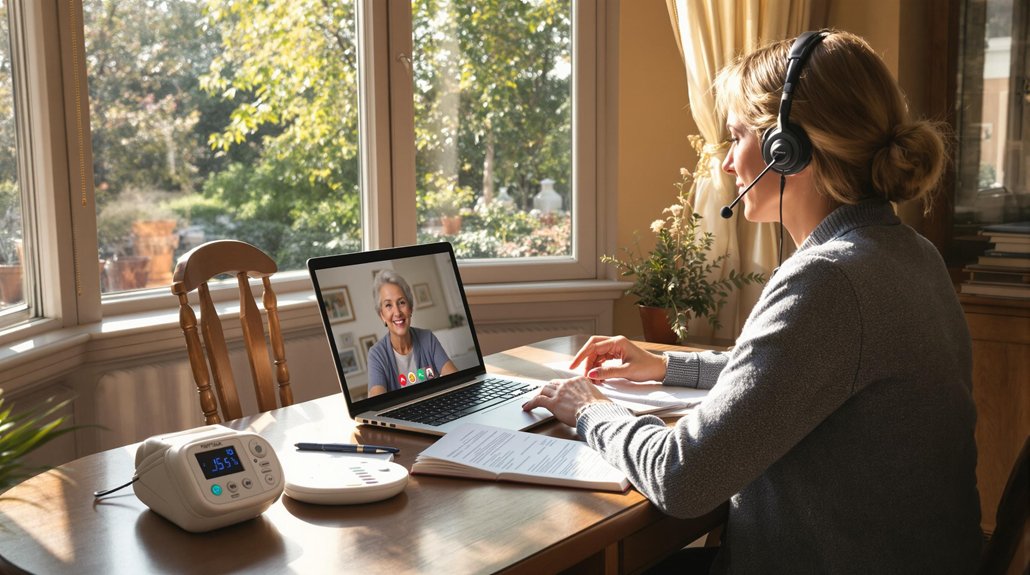Companion care provides non-medical assistance and friendship to help you or your loved one maintain independence at home. You’ll get personalized support with daily activities like meal prep, light housekeeping, and medication reminders, along with meaningful social interaction through activities and conversation. Your companion can accompany you to appointments and events, preventing isolation while giving your family peace of mind. Discover how this personalized care approach can transform daily living and enhance quality of life.
What Is Companion Care?
Companion care offers non-medical assistance and friendship to seniors who need help maintaining their independence at home.
As a companion caregiver, you’ll provide essential social interaction and emotional support to help combat loneliness and isolation that many older adults experience.
Your role involves engaging in companionship activities that bring joy and meaning to your client’s daily life. You might play cards, work on puzzles, read books together, or simply engage in meaningful conversations.
You’ll also assist with light household tasks, meal preparation, and transportation to appointments or social events.
Unlike medical caregivers, you won’t provide healthcare services. Instead, you’ll focus on creating a supportive environment that enhances your client’s quality of life through friendship, engagement, and reliable assistance with daily activities.
Private duty nursing is available for those who require more personalized medical care alongside companion services.
Types of Services Offered
Three main categories of services fall under companion care: social engagement, daily living assistance, and basic home support.
Social engagement includes personalized activities like playing games, reading together, sharing meals, or simply having meaningful conversations. These companionship services help prevent isolation and maintain emotional well-being.
Meaningful social activities and companionship keep seniors connected, active, and emotionally healthy while preventing feelings of loneliness and isolation.
Daily living assistance covers tasks such as medication reminders, grooming supervision, meal planning, and appointment scheduling. You’ll help clients stay on track with their routines while maintaining their independence.
Basic home support involves light housekeeping, organizing mail, caring for plants, and helping with errands. You might accompany clients to doctor’s appointments, grocery shopping, or social events.
These services guarantee your client’s environment remains safe and manageable while supporting their ability to age in place.
Qualified caregivers provide these essential services while ensuring seniors maintain dignity and comfort in their homes.
Benefits for Seniors and Families
While seniors face unique challenges as they age, quality companion care provides essential benefits for both elderly clients and their loved ones.
You’ll find that companion care helps prevent isolation by fostering regular social interaction through conversation, shared activities, and community engagement.
Your elderly family members receive consistent emotional support from caregivers who become trusted friends, offering companionship during meals, walks, and daily routines.
This reliable presence helps reduce anxiety and depression while promoting a more positive outlook.
For families, companion care delivers peace of mind, knowing your loved one isn’t alone and has someone watching for changes in health or behavior.
You’ll also experience reduced stress and more quality time together, as the caregiver handles routine tasks that might otherwise create family tension.
Professional caregivers can provide respite care services to give family members necessary breaks while ensuring continued quality care for their loved ones.
Finding the Right Caregiver
Selecting the ideal caregiver requires careful consideration of multiple factors to guarantee a strong match for your loved one’s needs and personality.
Start by evaluating caregiver qualifications, including their experience, training, and certifications in senior care. You’ll want to verify their background checks, references, and any specialized skills relevant to your situation.
Beyond technical qualifications, assess the caregiver personality traits that will mesh well with your loved one. Consider qualities like patience, empathy, reliability, and communication style.
It’s crucial to involve your family member in the selection process when possible. You can arrange initial meetings to observe how potential caregivers interact with your loved one and gauge their compatibility.
Trust your instincts – the right caregiver should make both you and your family member feel comfortable and confident.
The in-home care assessment process helps evaluate your specific situation and match you with compatible caregivers who meet your family’s unique needs.
Costs and Payment Options
Understanding companion care costs helps you plan effectively for long-term care needs. Companion care typically ranges from $18 to $30 per hour, depending on your location and specific services required. Most providers require a minimum number of hours per visit, usually between 2-4 hours.
You’ll find several payment options to manage these costs. Long-term care insurance coverage often includes companion care services, though benefits vary by policy. Medicare generally doesn’t cover companion care, but Medicaid may provide financial assistance through waiver programs in certain states.
Veterans can access companion care benefits through the VA’s Aid and Attendance program.
Consider exploring private pay options like reverse mortgages or life insurance conversions. Local aging agencies might also connect you with grants or sliding-scale payment programs to help offset costs.
Skilled caregivers undergo rigorous selection and training processes to ensure the highest quality of compassionate care for patients.
Creating a Care Schedule
Once you’ve determined your budget and payment approach, mapping out an effective care schedule becomes your next priority.
Consider both your loved one’s daily routines and the caregiver’s availability to create a schedule that works for everyone involved.
Start by identifying the specific times when your loved one needs the most assistance, such as mornings for getting dressed or evenings for meal preparation.
Many companion care services offer flexible timing options, ranging from a few hours per week to round-the-clock support. You can adjust the care schedule based on changing needs or circumstances.
Remember to build in some overlap time during caregiver shift changes to guarantee smooth changes and proper communication about your loved one’s care.
Document the schedule clearly and share it with all family members involved in the caregiving process.
Building Trust and Relationships
The foundation of successful companion care rests on building meaningful connections between caregivers and care recipients. To establish trust, you’ll need to practice active listening, show genuine interest in their stories, and demonstrate reliability in your commitments.
Building genuine connections and earning trust through active listening is the cornerstone of meaningful companion care relationships.
Key trust building techniques include maintaining eye contact during conversations, respecting personal boundaries, and following through on promised activities or tasks. You’ll find that relationship dynamics improve when you’re consistent with your behavior and transparent about your intentions.
Remember to be patient, as trust develops gradually over time. Share appropriate personal experiences to help your care recipient feel comfortable, and always validate their feelings and concerns.
When you demonstrate empathy and maintain professional boundaries, you create a supportive environment that enhances the caregiving experience for both parties.
Safety Measures and Protocols
While building trust creates emotional safety, physical safety requires specific protocols and preventive measures.
You’ll need to understand emergency protocols and maintain clear documentation of your client’s medical conditions, medications, and emergency contacts. Keep these details readily accessible in case of urgent situations.
Complete essential safety training that covers fall prevention, basic first aid, and proper lifting techniques.
You’ll learn to identify potential hazards in the home and take steps to prevent accidents before they occur. Always keep your phone charged and within reach, and know the quickest route to nearby medical facilities.
Stay current with your client’s changing needs and update safety protocols accordingly.
Regular communication with family members and healthcare providers guarantees you’re prepared to handle any situation that may arise.
Monitoring and Quality Assurance
Maintaining high-quality care requires consistent monitoring and evaluation of your services.
You’ll need to establish regular caregiver supervision practices to guarantee your clients receive the best possible care. This includes conducting scheduled and unscheduled visits to observe caregivers in action and gather feedback from clients and their families.
Quality assessments should be performed routinely through client satisfaction surveys, care plan reviews, and progress reports.
You’ll want to document any changes in your client’s condition, needs, or preferences to adjust care strategies accordingly.
It’s crucial to maintain open communication channels between caregivers, clients, family members, and healthcare providers.
When you identify areas for improvement, implement necessary changes promptly and provide additional training to caregivers as needed.
Conclusion
Companion care brings comfort and support to seniors who need a helping hand. Just as a close friend brightens your day, our caregivers bring warmth and kindness into your loved one’s home. Whether they need someone to talk to, help with daily tasks, or around-the-clock care, we make sure they never feel alone. Our trained caregivers treat each person with respect and understanding, making every day more meaningful. You don’t have to handle this journey by yourself – Focus Family Care is here to walk beside you every step of the way.
If you or a loved one need help, don’t wait. Reach out to Focus Family Care today at (561) 693-1311 or email us at info@focusfamilycare.com.




